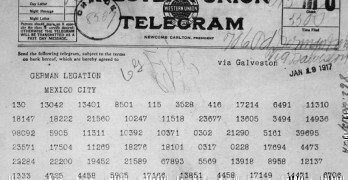On this day in 1917, President Woodrow Wilson learned of a shocking piece of paper that made America’s entry into World War I inevitable. And current research shows the Americans didn’t know everything German diplomats intended.

The Zimmermann Telegram was a message sent on January 12, 1917, from the German foreign minister Arthur Zimmerman to the country’s embassy in Washington, D.C., to be relayed to German representatives in Mexico.
In the message, Zimmermann instructed the German diplomats to approach the Mexican government, if United States entered the war in Europe, to offer an alliance between Germany and Mexico. The Germans would offer “generous financial support” to Mexico as an ally, with the following proposal, “an understanding on our part that Mexico is to reconquer lost territory in Texas, New Mexico, and Arizona.” Zimmermann also said Germany planned to start unrestricted submarine warfare on February 1, an act that could force the Americans toward a conflict with Germany.
To be sure, the Zimmermann telegram by itself didn’t force the United States’ entry into World War I; that would come five weeks after the telegram was made public, when the Senate and the House passed war resolutions. But its existence became a turning point in the debate over intervention, and it did lead to solidarity between the President and Congress over “the war to end all wars.”
President Wilson broke off diplomatic relations on February 3, 1917, after German submarine attacks resumed. But without evidence of expanded German hostilities, Wilson and the Americans remained neutral, at least in the short-term.
Three months earlier, President Wilson won a narrow victory for a second term against Charles Evans Hughes, with the promise to keep America out of the European war. On February 26, 1917, he was dealing with a Republican Senate filibuster over arming merchant ships when shocking news arrived at the White House via the U.S. ambassador in Great Britain, Walter Hines Page.
British code breakers obtained two copies of the coded Zimmermann telegram, and they were able to break the cypher using a broken code and comparing the telegrams. Not only was Zimmermann willing to finance an adventure by the Mexican government to reclaim territory lost to the United States, it wanted Mexico to intercede with Japan to get Japan to switch sides in the war. (Japan played a limited role against Germany in World War I.)
An outraged President Wilson planned to make the telegram public, but only after tactics had been put in place to obscure Britain as the code breaker. On March 1, Wilson dropped the Zimmermann telegram bombshell when its text appeared in newspapers across the country. "No other event of the war ...so stunned the American people,” said Wilson’s biographer, Arthur Link.
Wilson’s political opponents and various groups insisted the telegram was a forgery, partly because the idea made no sense due to Germany's very limited ability to aid Mexico. But one day later, Zimmermann admitted publicly that the telegram was sent by him and it was correct, noting the plan was contingent on hostilities between Germany and the United States.
Later that month, Zimmermann gave a more detailed explanation about admitting that he ordered the telegram.
“I instructed the Minister to Mexico, in the event of war with the United States, to propose a German alliance to Mexico, and simultaneously to suggest that Japan join the alliance,” Zimmermann said. “I declared expressly that, despite the submarine war, we hoped that America would maintain neutrality. My instructions were to be carried out only after the United States declared war and a state of war supervened. I believe the instructions were absolutely loyal as regards the United States.”
The tide had turned against Germany within the United States. President Wilson asked Congress to return to Washington for a joint session on April 2, after his cabinet recommended that the President ask for a war declaration. In his speech, Wilson noted the German government “means to stir up enemies against us at our very doors - the intercepted note to the German Minister at Mexico City is eloquent evidence.”
The joint war resolution came from Congress on April 6, 1917, but neither Wilson nor Congress likely knew of Zimmermann’s original plan for the telegram.
In 2007, a professor in Germany went through the foreign ministry’s archives from World War I and found the draft version of the Zimmermann telegram. The draft text indicated that in addition to the re-acquisition of Texas, Arizona and New Mexico, “California should be reserved for Japan.” But that text wasn’t in the telegram’s final version.
After news broke about the telegram, Japan’s ambassador to Germany called it “too ridiculous for words,” and the Mexican government officially declined the offer on April 14, 1917. Zimmermann resigned as foreign minister in August 1917. But the telegram's impact on American public opinion about Germany's intentions was a significant factor in the United States' decision to enter the Great War.
Scott Bomboy is the editor in chief of the National Constitution Center.







